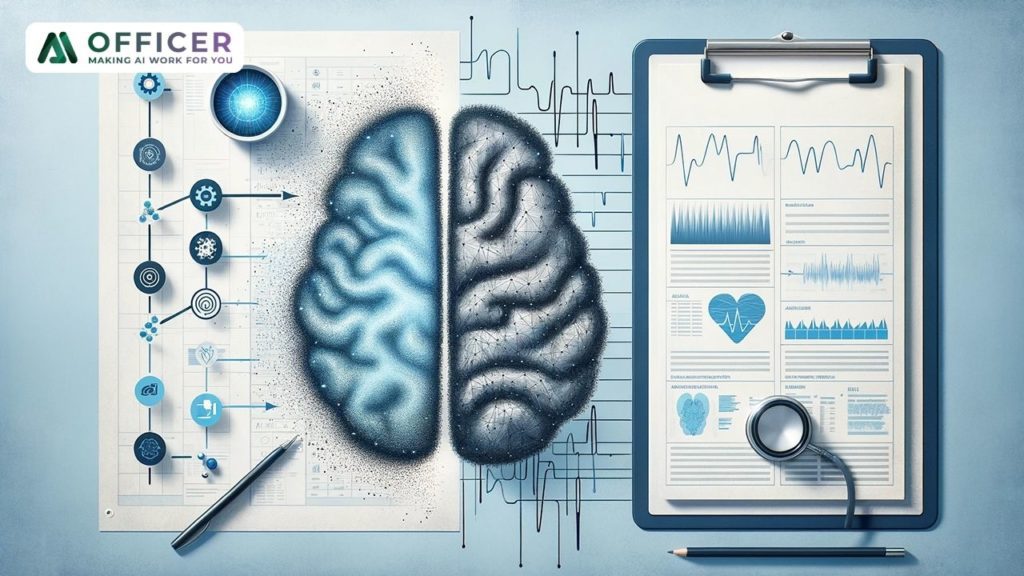
As a healthcare entrepreneur, you understand the power of accurate medical data. Yet, traditional AI models often struggle with the complexities of clinical notes, riddled with jargon, abbreviations and nuances.
Here’s where data augmentation steps in, supercharging AI’s ability to process and comprehend these vital documents.
Think of it this way : Imagine feeding your AI a limited diet of plain text. While it might learn to understand basic sentences, it won’t grasp the richness of human language.
Data augmentation diversifies this diet, introducing variations like synonyms, paraphrases and even synthetic notes mimicking real-world scenarios. The result? An AI that speaks the language of medicine fluently.
The integration of AI into clinical settings, particularly in understanding and processing clinical notes, stands at the forefront of this transformative journey.
THE POWER OF DATA AUGMENTATION IN CLINICAL AI
Bridging the Gap in AI Understanding
Clinical notes, with their nuanced language and specialized terminology, present a significant challenge for AI systems. The inherent variability and complexity of these documents can hinder AI’s ability to accurately interpret and utilize the information they contain. This is where data augmentation comes into play.
By enriching the training datasets with a broader spectrum of linguistic variations and clinical scenarios, data augmentation enhances AI’s comprehension and generalization capabilities.
A recent study highlighted by HealthITAnalytics.com underlines the effectiveness of data augmentation in improving the generalization of Large Language Models (LLMs) on clinical notes.
STEPS TO IMPLEMENTING DATA AUGMENTATION
- Identifying Data Gaps : Begin by analyzing your AI model’s current performance and identifying areas where its understanding of clinical notes is lacking.
- Generating Synthetic Data : Use techniques such as paraphrasing, back-translation, and synthetic data generation to expand your dataset with diverse clinical narratives.
- Incorporating Domain-Specific Knowledge : Enrich your datasets with domain-specific terminology and context to enhance AI’s ability to grasp complex medical concepts.
- Continuous Learning and Feedback : Implement a feedback loop where the AI model’s interpretations are regularly reviewed by healthcare professionals, allowing for continuous improvement and refinement.
BENEFITS FOR HEALTHCARE SMES AND STARTUPS
- Enhanced accuracy : Improved AI interpretation of clinical notes leads to better diagnoses, treatment plans and patient outcomes.
- Streamlined workflows : AI assistants can automate tasks like data extraction and summarization, freeing up valuable time for clinicians.
- Reduced costs : Data augmentation can help mitigate bias and errors in AI models, minimizing rework and associated costs.
At AI Officer, we specialize in transforming healthcare through AI.
Our suite of solutions includes advanced AI models tailored for interpreting clinical notes, predictive analytics for patient care and automated workflows to streamline operations. Our approach is grounded in a deep understanding of the healthcare industry’s unique challenges and opportunities.
In the rapidly evolving world of healthcare technology, staying informed is key to success. Keep an eye on our blog for the latest insights and trends in AI that can revolutionize your healthcare business.
For a personalized approach to integrating AI into your healthcare operations, reach out to our AI Officers today. Our team is dedicated to providing you with AI solutions that not only meet but exceed your expectations, driving your business forward in the competitive healthcare industry.
Dive into the future of healthcare with AI Officer—where innovation meets excellence. Let’s transform patient care together.




